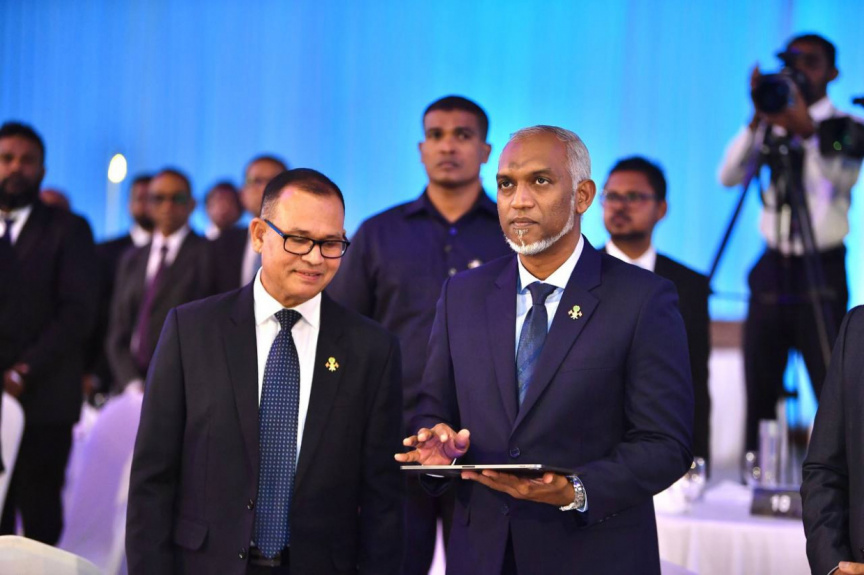
MDP's chairperson Fayyaz Ismail. (Sun Photo/Moosa Nadheem)
Fayyaz Ismail, the chairperson of the main opposition Maldivian Democratic Party (MDP), has called on President Dr. Mohamed Muizzu not to ratify controversial amendments made to the Decentralization Act – amendments that were passed by the Parliament on Wednesday despite widespread concern that it rolls back years of progress in empowering local councils and promote decentralization.
The government-drafted amendments to the Decentralization Act curb the powers of local councils, including in matters of recruitment of staff, lease of land and lagoons under the jurisdiction of councils, and running developmental projects.
On Wednesday, the ruling People’s National Congress (PNC) used its supermajority in the Parliament to push through the changes with a majority vote of 45-7, despite widespread concern, including from multiple councils.

During a national council meeting of the MDP later that night, Fayyaz expressed concern over the decision of the PNC to push through the bill within the matter of two days “as has become the usual modis operandi for government lawmakers” with “complete disregard for the concerns raised by over 100 councils.”
He alleged that the PNC lawmakers acted on “direct orders” from President Muizzu.
He urged President Muizzu against ratifying the amendments “for the sake of this country.”
“Tonight, we call upon President Muizzu: do not to ratify this! For the sake of this country! Think about this! Stop this! God willing, the next administration will be an MDP one. I take this opportunity to promise that we will revert it back to how it is now, and grant islands greater powers,” he said.

Rejecting criticism regarding the amendments, Local Government Minister Adam Shareef insisted on Wednesday that President Muizzu aims to improve the decentralization system and financially empower local councils.
He said that giving councils inhabited islands, meeting councilors and making decisions in accordance with their proposals, making changes proposed by councils to developmental projects in islands, are all part of efforts by President Muizzu under a strong policy to boost public confidence in councils.

The amendments grant additional powers to the Finance Ministry and the Local Government Authority (LGA), but provide none to the Local Government Ministry.
The bill passed on Wednesday outlines five main amendments:
Local Authority Company Operations: These companies would be prohibited from engaging in economic activities already undertaken by private enterprises in their operating islands. Their work must be essential for rural infrastructure development, and projects would require an investment exceeding MVR 10,000,000. Conflicting businesses would be discontinued within 90 days of the amendment's enactment.
Rent from Public Service Allocations: Councils would be barred from charging rent for land or buildings allocated to parties providing basic services to the public.
Revenue Allocation: Councils would receive revenue after deducting any state taxes, and if they have not paid for public services for over six months.
Bank Account Maintenance: Councils would be required to maintain bank accounts according to Ministry of Finance procedures and provide statements upon request.
Restrictions in Final Year: If a council's term is 365 days or less from expiration, certain actions would be restricted without adherence to norms set by the Ministry of Finance and the Local Government Authority (LGA). These include:
Recruitment of contractual or long-term employees for council offices.
Lease and grant of land, lagoons, and reef areas under council jurisdiction.
Initiation of new development projects not specified in council development plans.
The MDP, which introduced the decentralization system during its first administration in 2010, and amended the law again in 2019 to grant councils greater financial autonomy, has slammed the proposed amendments as an attempt by the government to concentrate powers and silence the voice of the people.
Several councils, including those in Fuvahmulah City, Kulhudhuffushi City and L. Gan, have issued statements protesting against the amendments.
However, the PNC insists the changes are necessary better regulate spending and prevent wastage of state funds.